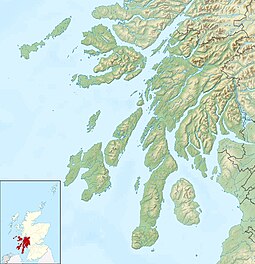Glunimore Island
 | |
| Location | |
|---|---|
| OS grid reference | NR7419905020 |
| Coordinates | 55°17′14″N 5°33′33″W / 55.28716°N 5.55912°W |
| Administration | |
| Council area | Argyll and Bute |
| Country | Scotland |
| Sovereign state | United Kingdom |
| Demographics | |
| Population | 0 |
Glunimore Island is an uninhabited island around 3 miles (5 kilometres) southeast of the Kintyre peninsula, Scotland.[1][2] It lies alongside Sanda Island and Sheep Island
The island is just 200 metres (660 ft) long and rises to a height of 27 metres (89 ft). There is a cave on the shoreline at the north. A drying reef surrounds the island to the north and east. More of these dangerous reefs litter the sound between Glunimore, Sanda and Sheep Island. Paterson's Rock is yet another dangerous rock around 1.5 kilometres (a mile) to the east. Despite these obstacles the natural harbour formed by the three islands is still often used by boats rounding the Mull of Kintyre.
Glunimore and neighbouring Sheep Island are the most important breeding grounds of puffins in the Clyde and the birds are now returning from here to Ailsa Craig another traditional breeding ground. Guillemots and razorbills also nest here.
The island was visited in 1899 by two naturalists performing a survey for the Natural History Society of Glasgow.
Glunimore Island lends its name to a cottage on neighbouring Sanda Island and to a house in Campbeltown.
References
[edit]- ^ Ordnance Survey: Landranger map sheet 68 South Kintyre & Campbeltown (Map). Ordnance Survey. 2012. ISBN 9780319229637.
- ^ "Ordnance Survey: 1:50,000 Scale Gazetteer" (csv (download)). www.ordnancesurvey.co.uk. Ordnance Survey. 1 January 2016. Retrieved 18 February 2016.

